Ministry of Consumer Affairs, Food & Public Distribution
India’s Food Security
Transformative Role of Food Corporation of India (FCI)
Posted On: 23 NOV 2024 11:13AM
Amidst the sprawling agricultural landscape of India, where verdant fields sway under the warm embrace of the sun, the Food Corporation of India (FCI) stands as a sentinel of food security and hope. FCI has been entrusted with the formidable task of ensuring food for all. The recent infusion of Rs. 10,700 Crore in equity for FCI’s working capital for 2024-25, as approved by the Cabinet Committee on Economic Affairs (CCEA) under the leadership of Prime Minister Narendra Modi, highlights the government’s unwavering dedication to fortifying India’s agricultural backbone and uplifting its farmers. The infusion of Equity is a significant step towards enhancing the operational capabilities of FCI in fulfilling its mandate effectively. FCI resorts to short term borrowings to match the gap of fund requirement. This infusion will help to lower the interest burden and will ultimately reduce the subsidy of Government of India.
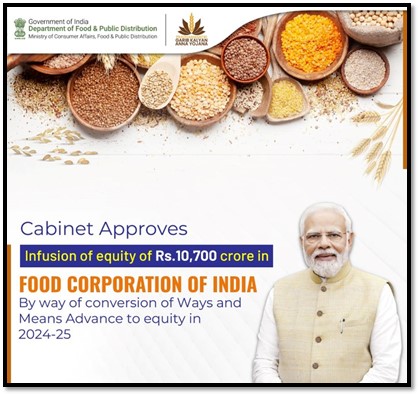
What is Food Corporation of India?
The Food Corporation of India (FCI) is a Public Sector Undertaking under the Department of Food & Public Distribution, Ministry of Consumer Affairs, Food & Public Distribution, Government of India (Gol). The Corporation is the main agency responsible for execution of food policies of the Gol. The functions of FCI primarily include Purchase, Storage, Movement, Distribution and Sale of foodgrains on behalf of the Gol.
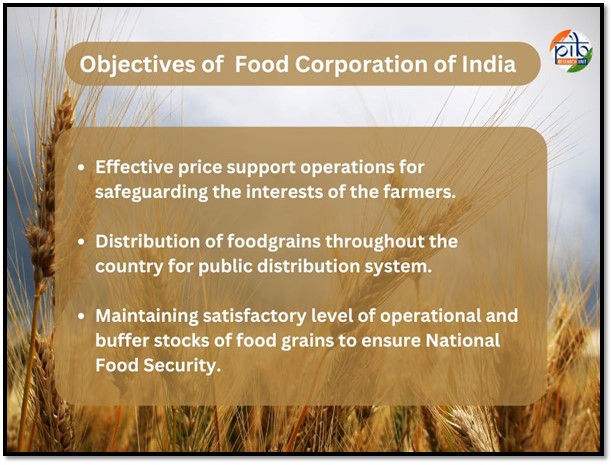
History
The Food Corporation of India (FCI) was set up under the Food Corporation’s Act of 1964 to be the nodal central government agency, responsible for the purchase, storage, interstate movement, and distribution of food grains. Since its inception, FCI has led a glorious journey of 60 long years, duly fulfilling its duties and ably playing its role towards the ambitious target of ensuring food security. FCI started its journey in 1965 with an authorised capital of Rs. 100 Crores and equity of Rs. 4 Crores. The equity of FCI was increased from time to time.
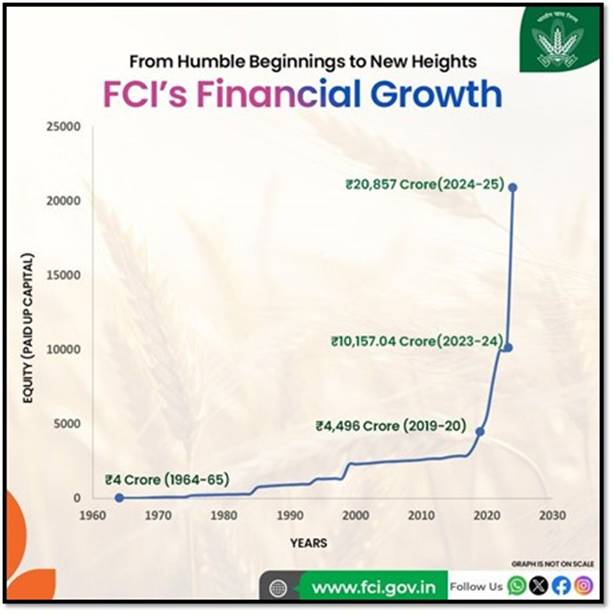
Efforts and Impact
FCI meets the requirements of NFSA by procuring grains that are issued at the Central Issue Price, set by the Government, to help the economically vulnerable sections of society. FCI delivers food grains to State Governments and agencies from its base depots for distribution through Fair Price Shops. In order to augment nutrition security along with food security, the corporation has facilitated the distribution of nutrient-rich fortified rice among ration card holders. FCI's efforts in distributing subsidized food grains through the Public Distribution System (PDS) ensured that even the economically disadvantaged sections of society have access to essential food items. By regulating the procurement and distribution of food grains, FCI provides a safety net for farmers (encouraging them to produce staple crops without the fear of price volatility) and also helps stabilize food prices in the market, and in the recent months, through OMSS market interventions, price stabilization was achieved. This is critical in preventing excessive inflation and ensuring that food remains affordable for the masses.
FCI Stocks data ( as on 16 Nov 2024)
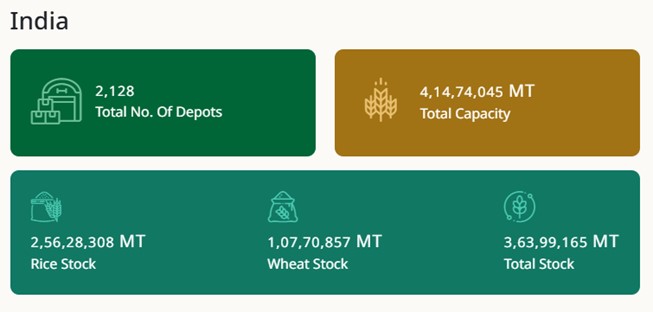
FCI at the forefront during Pandemic
When the whole world was under lockdown, FCI rose to the occasion to provide food security to the nation and ensured that nobody was deprived of food. Annual allocation of foodgrains to states was increased from 600 LMT to 1100 LMT. War room was set up for ensuring daily monitoring and effective coordination of all stakeholders. FCI moved around 600 LMT of food grains during 2020-21 and 2021-22 against normal average annual movement of 400 LMT. FCI ensured availability of stocks in every nook and corner to meet the allocation for additional schemes. FCI has shown its wherewithal in enabling the free distribution of 1118 LMT of food grains to more than 80 crore beneficiaries and additionally 6.40 LMT food grains to stranded migrants.
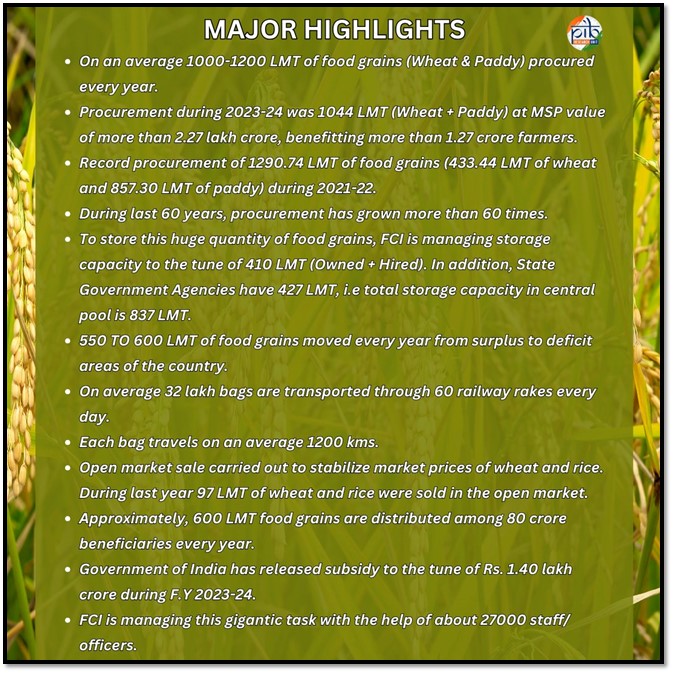
Reforms for a better future
FCI has taken up many initiatives aimed at addressing the challenges faced by both internal and external stakeholders as part of its mission to radically transform itself like:
Structural Reforms
- Direct Benefit Transfer (DBT) Initiative: Implemented the ‘One Nation, One MSP’ policy to ensure direct online payments to all farmers, streamlining the payment process and enhancing transparency.
- Digital Procurement: Comprehensive computerization of total food grain procurement operations across the country, enabling greater transparency and faster services for farmers.
- Modernized Storage Solutions: The traditional Cover and Plinth storage, which stood at 30.25 LMT in 2014, has been progressively replaced with scientifically managed storage depots and silos.
- Steel Silos Success: Steel silos for bulk storage of food grains have become a significant achievement for FCI. Currently, 22.75 LMT of silos are operational, with an additional 41 LMT in development.
- AI-Enabled Video Surveillance: The installation of CCTV-based, AI-enabled video surveillance systems in FCI depots is underway to enhance the security and safety of food grains and warehouses.
- Mechanized Handling: Mechanized handling of food grains at FCI depots has been made mandatory for contractors and is now a required component of handling contracts.
- Depot Upgradation: Out of 489 FCI-owned depots assessed and rated by a third party, upgrades have been made to meet quality standards. Currently, only six depots remain in the 2- and 3-star categories, indicating significant improvements.
Digital Reforms
- Integrated Supply Chain Management System: Operations and services across all levels—depots (owned/hired), divisional, regional, zonal, and headquarters—are integrated through the ANNA DARPAN portal for seamless end-to-end supply chain management.
- Central Food Procurement Portal (CFPP): The integration of Minimum Support Price (MSP) procurement operations nationwide into the CFPP serves as a single, reliable source for food grain procurement data across India.
- Warehouse Inventory Network and Governing System (WINGS): This pioneering application streamlines the association and tagging of mills with depots and manages the allocation of stack space, transforming inventory processes within FCI.
- Vehicle Location Tracking System (VLTS): An innovative web portal and mobile application for tracking GPS-equipped vehicles, ensuring efficient monitoring of long-route truck and rail movements.
- Digitized Workforce: Implementation of the e-Office system in all 198 administrative offices, encompassing over 12,000 users, alongside the deployment of the Depot Online System (DOS) in approximately 1,900 warehouses (both owned and hired).
- Bill Tracking System (BTS): A key achievement that has significantly reduced the average payment processing time from 23 days to just 8 days, enhancing operational efficiency.
Financial reforms
- Equity Infusion Approval: The Cabinet Committee on Economic Affairs (CCEA), led by Prime Minister Shri Narendra Modi, approved an equity infusion of ₹10,700 crore for working capital in the financial year 2024-25. This move reinforces the government’s commitment to supporting farmers and bolstering the agricultural sector, ensuring long-term stability for India’s agrarian economy.
- Asset Monetization Success: FCI has achieved asset monetization amounting to ₹6,088 crore by the end of FY 2023-24.
- Reduction in Interest Costs: Through effective treasury operations, smooth subsidy flows, and better fund utilization, FCI achieved a notable reduction in interest expenses. In FY 2023-24, FCI reduced interest costs to ₹3,268 crore from ₹3,679 crore in FY 2022-23, resulting in savings of ₹411 crore.
- e-Freight Transaction Charges Waiver: In FY 2022-23, FCI secured a waiver of e-Freight transaction charges imposed by SBI, creating perpetual savings for the corporation on the movement of food grains via rakes.
- Interest Rate Reduction: In FY 2021-22, successful negotiations with the Food Credit Consortium (FCC) led to a reduction in the interest rate on the Cash Credit Limit from 7.73% to 6.68% per annum for FCI and from 8.73% to 7.28% per annum for State Government Agencies. This measure resulted in savings of ₹777 crore for the exchequer.
Quality Control reforms
- AI-Based Automatic Grain Analyzer (AGA): FCI has introduced the use of AI-powered Automatic Grain Analyzers to minimize human intervention and ensure greater transparency in the grain procurement process.
- Mixed Indicator Method for Raw Rice Age Determination: FCI has developed a Mixed Indicator method for accurately determining the age of custom-milled raw rice during its acceptance in Central Pool Procurement. This method has been mandatory for testing all raw rice stocks since October 1, 2021.
- Digital Integration of Quality Control Labs: Quality control labs within the Department of Food and Public Distribution (DFPD) and FCI are now integrated digitally through the Quality Management System (QMS) software. This integration links depot-level labs to FCI headquarters and DFPD labs, providing real-time data on a centralized dashboard for sample testing, including rejection rates.
Other reforms
- Net Storage and Transit Losses: In 2013-14, the net storage loss for combined wheat and rice was recorded at 0.17%. By 2023-24, FCI achieved a net gain of 0.22%. Transit losses have also seen a substantial decrease from 0.46% in 2013-14 to just 0.16% in 2023-24.
- High-Security Measures: To combat theft and pilferage during transport, FCI introduced tamper-proof, high-security cable seals meeting IS 17381:2021 standards from January 1, 2023. This initiative has led to a 96% reduction in the number of rakes with transit losses exceeding 0.5%.
- Expansion of Decentralized Procurement (DCP): Through strategic interventions, the number of states participating in DCP increased to 17 for rice and 9 for wheat in 2023-24, compared to 10 for rice and 5 for wheat in 2014.
- Grievance Redressal Platform: FCI launched a dedicated grievance portal and a mobile app for Android users to facilitate quick resolution of issues faced by rice millers, improving responsiveness and service quality.
Conclusion
The Food Corporation of India (FCI) remains an integral pillar in ensuring India’s food security and sustaining agricultural growth. Over the years, FCI has evolved, adapting to the changing dynamics of the food supply chain and leveraging technology to meet modern challenges. With continued government backing and strategic innovations, FCI is poised to enhance its legacy as a protector of food security, ensuring that no citizen goes hungry and that India’s agricultural backbone remains robust and future-ready.
References
https://fci.gov.in/
https://fcivlts.in/#features
https://pib.gov.in/PressReleaseIframePage.aspx?PRID=2071133.
https://x.com/FCI_India/highlights
Download in PDF
***
Santosh Kumar/ Ritu Kataria/ Madiha Iqbal
(Backgrounder ID: 153444)
Visitor Counter : 11